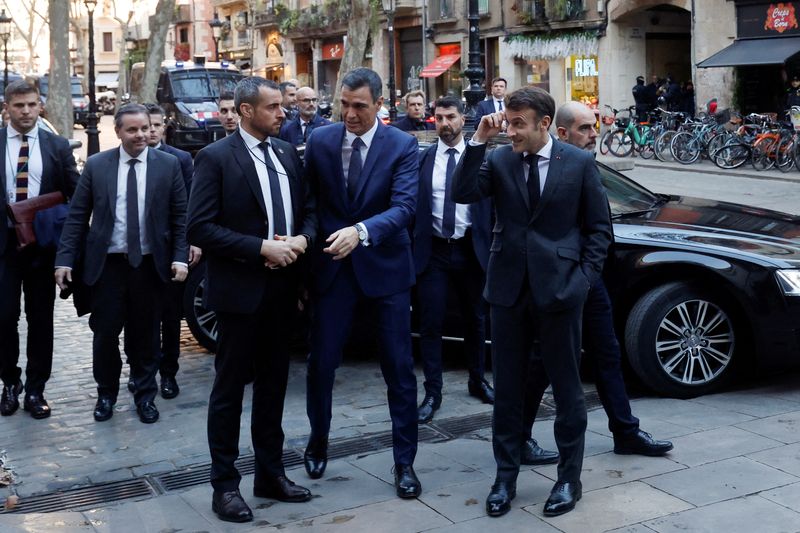[the_ad id="21475"]
[ad_1]
© Reuters. FILE PHOTO: Spain’s Prime Minister Pedro Sanchez and French President Emmanuel Macron arrive to Picasso Museum after Spain-France summit in Barcelona, Spain, January 19, 2023. REUTERS/Albert Gea/File Photo
By Michel Rose, Belén Carreño and Kate Abnett
PARIS/MADRID/BRUSSELS (Reuters) – A new row has erupted between France, Germany and Spain over nuclear energy, with Paris furious about a lack of support from Berlin and Madrid for its efforts to have nuclear-derived hydrogen labelled as ‘green’ in EU legislation, sources said.
The dispute, which could block a multi-billion euro hydrogen pipeline from the Iberian peninsula via France to Central Europe, is also delaying Europe’s green energy legislation and threatening to break out into the open at an European Union summit on Thursday.
France, which relies on its aging nuclear fleet to generate electricity, is leading a campaign to count hydrogen made using nuclear power — known as “red” hydrogen — in the EU’s new renewable energy targets, which currently focus on green hydrogen made using electricity from renewable sources.
Paris is now accusing Spain and Germany of reneging on commitments France says their leaders made at meetings in Barcelona and Paris to consider ‘low-carbon’ energy, which is code for nuclear, as clean.
“These negotiations are not taking a good turn,” Agnes Pannier-Runacher, France’s energy minister, told a small number of reporters last week about the EU’s new renewable energy targets, included in a bill known as the RED-3 directive.
“It would not be understandable for Spain and Germany to take different positions in Brussels and not keep their commitments,” she said.
After much foot-dragging, French President Emmanuel Macron agreed to the hydrogen pipeline between Barcelona and Marseille in October, a deal formalised at a summit with Spanish counterpart Pedro Sanchez in Barcelona in January.
Germany was formally added to the project after a joint Franco-German summit in Paris a few days later, with Berlin wanting to import hydrogen from Iberia and further south as it weans itself off Russian gas.
Macron’s green light for the so-called H2Med or BarMar project was, according to Paris, in return for Spanish and German commitments on red hydrogen.
French officials point to a joint statement signed in Barcelona that states “Spain and France recognise the importance of the production, transportation and consumption of clean hydrogen as produced from renewable and…
Click Here to Read the Full Original Article at All News…
[ad_2]
[the_ad id="21476"]
